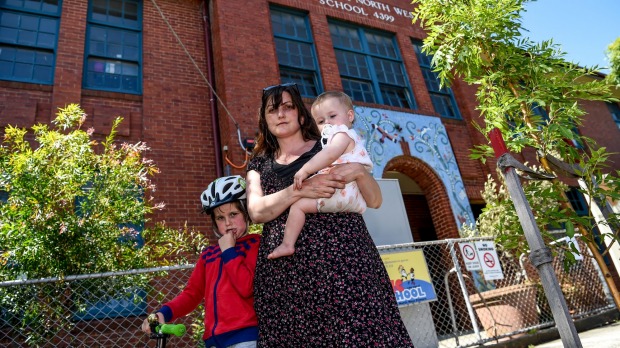
One in four of the children who attend a Brunswick school that calls for tolerance for vaccine dodgers has contracted chickenpox.
At least 80 of the 320 pupils at Brunswick North West Primary in Melbourne’s north have become ill with the disease in the past fortnight.
It is understood the illness spread through grade 6, before making its way through the lower levels to grade 2.
The Department of Health was first notified about the chickenpox cases on November 26.
“There are no firm figures on the number of students who have contracted the illness since then, but we’ve been advised that over the period there has been an absentee rate of about 25 per cent on any given day,” a department spokesman said.

“Given the time of year, there are a number of other reasons which would lead to a higher than usual absentee rate.”
Children who are immunised can still contract chickenpox.
Brunswick North West Primary School has called for parents to be tolerant of opposing views on vaccination, although no school in Victoria can bar a child who is not vaccinated from enrolling.

The school has a lower immunisation rate than the state and national averages.
In the May newsletter, the school’s principal Trevor Bowen said 73.2 per cent of students were immunised, compared with 92 per cent within the local postcode.
In Victoria, the rate is 90.4 per cent, the newsletter says.
The school has previously asked parents to be tolerant of those with differing opinions on immunisation and there was still evidence of tension on Thursday between parents who did and those did not vaccinate their children.
Parent Sara McKenzie vaccinated her son Wesley, who is in grade one, but that didn’t stop him getting chickenpox.
She admits she was shocked that the rates of immunisation were so low at the school.
“I think everyone should get vaccinated because it’s a matter of public health and community safety,” she said. “You don’t just vaccinate for your kids, you have to consider the whole community.”
Ms McKenzie said she had been told that other schools in Brunswick have similar vaccination rates.
“No matter how angry you get, what are they going to do? You can’t make people vaccinate their children,” she said.
But some parents were less concerned about the issue. Meaghan Ward has a vaccinated daughter in grade one who was also caught up in the outbreak.
She said she would rather everyone was immunised but didn’t believe schools should discriminate against children who weren’t.
“To say that the school is actively encouraging non-immunised children, I don’t think that’s true,” she said. “They have to be fair.”
Another parent, Rachel Berman, has two sons at the school, including one in grade two who got chickenpox. She didn’t know that the vaccination rates at the school were lower than the rest of the state.
“My kids are pretty healthy and it is definitely a parents’ choice, but if you can see a pattern … then that would raise concerns for me,” she said.
A previous newsletter aiming to take the heat out of the conflict said there were many areas of school life where a range of opinions were accommodated.
“Staff respect the rights of every family to make choices about immunisation and we will definitely not exclude children who are not fully immunised from our service,” the newsletter says.
“We expect all community members to act respectfully and with tolerance when interacting with other parents and carers who may have a differing opinion to their own. This includes an opposing understanding about child immunisation.”
Department of Education spokesman Alex Munro said no student could be barred from a school in Victoria on the basis that they were not immunised. However, parents are required to inform the school of their child’s immunisation status.
“Parents are required to provide an immunisation status certificate to the school regardless of whether their child is or is not immunised,” Mr Munro said.
The state government’s “No Jab, No Play” laws come into effect on January 1 next year, but they do not apply to primary or high schools.
Under the policy, unvaccinated pre-schoolers will be banned from attending child care or kindergarten. unless they are vaccinated.
It follows moves by the federal government to strip family assistance payments from parents who do not immunise their children.
Vaccination rates in Victoria have hovered at about 90 per cent for a number of years, but that number has plateaued, something Health Minister Jill Hennessy wants to address.
“We’re significantly concerned about the myth makers who go out encouraging people not to immunise their children,” Ms Hennessy said.
“Get your advice from a doctor, not from some quack who’s opposed to vaccination based on dodgy science.”
Monash Children’s Hospital head of infection and immunity Jim Buttery said children who were immunised could still contract chickenpox but do not end up with as many spots as those who did not receive the vaccine.
He said the chickenpox vaccine had a 80 per cent success rate and that if a child still comes down with the disease, they will end up with about 25 spots. However, a child without the vaccine will end up with 800.
Chickenpox is highly contagious and anyone who comes down with the condition will infect another seven to nine people, Dr Buttery said. For herd immunity to kick in, he said about 90 per cent of children need to be immunised.
With Craig Butt
More information on chickenpox is available via the state government’s Better Health Channel website: betterhealth.vic.gov.au/health/conditionsandtreatments/chickenpox
* Clarification: An earlier version of this report described the school as actively welcoming unvaccinated students. However, we understand the school’s newsletter from which this was inferred was a call for tolerance as opposed to an ‘active welcome’.
